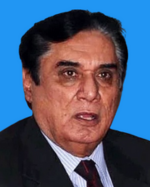National Accountability Bureau (NAB)
The National Accountability Bureau (NAB) is Pakistan’s leading anti-corruption agency, established to combat corruption and money laundering in the country. It was founded under the Ehtesab Act, 1997, initially as an Ehtesab Cell, and later succeeded by NAB under the National Accountability Ordinance, 1999.
Comprehensive Overview
| NAB Logo: |
 |
| Agency Overview: |
| Formed: 1999; 25 years ago |
| Preceding: Ehtesab Cell |
| Jurisdiction: Pakistan |
| Headquarters: G-5, Shahrah-i-Jamuriat, Islamabad. |
| Employees: Furqan Mirza |
| Agency Executive: Lt Gen (retd) Nazir Ahmed Butt, Chairman |
| Parent Department: Autonomous |
| Website: |
| www.nab.gov.pk |
Establishment and Evolution
- Ehtesab Act, 1997: Initially established as an Ehtesab Cell to investigate and prosecute corruption cases.
- National Accountability Ordinance, 1999: NAB was established under this ordinance, expanding its responsibilities to include prevention and awareness-raising of corruption, as well as conducting money-laundering investigations under the Anti-Money Laundering Act, 2010.
Operational Structure
- Regional Bureaus: NAB operates through regional bureaus located in Rawalpindi, Lahore, Karachi, Quetta, Peshawar, Sukkur, and Multan. These bureaus are led by Directors General who oversee operations in their respective regions.
- Sub-Offices: Additionally, there are three sub-offices located in Gwadar, Hyderabad, and Gilgit and Baltistan. These sub-offices are overseen by Additional Directors.
Functions and Powers:
The National Accountability Bureau performs the following functions and exercises the following powers:
- Investigation: NAB conducts thorough investigations into allegations of corruption and financial irregularities. It has the authority to summon individuals, obtain evidence, and gather information relevant to its inquiries.
- Prosecution: NAB prosecutes individuals accused of corruption and corrupt practices in special accountability courts established under the National Accountability Ordinance. These courts are responsible for adjudicating cases related to corruption and financial crimes.
- Prevention: NAB engages in preventive measures to raise awareness about corruption, promote ethical behavior, and strengthen institutional mechanisms for transparency and accountability.
- Awareness and Education: NAB conducts awareness campaigns, seminars, and workshops to educate the public about the adverse effects of corruption and the importance of integrity and accountability in society.
- International Cooperation: NAB collaborates with international organizations and law enforcement agencies to exchange information, share best practices, and enhance capacity-building initiatives aimed at combating transnational corruption and money laundering.
Current Leadership and Key Officials
The current senior management team of NAB includes individuals with diverse expertise and roles. Below is a detailed breakdown of NAB’s leadership structure:
- Chairman NAB: Lt. Gen. (R) Nazir Ahmed Butt
- Prosecutor General of Accountability: Syed Ihtesham Qadir Shah
- Deputy Chairman NAB: Sohail Nasir
- Director General (Operations): Tariq Hamid Butt
- Director General (Rawalpindi): Mirza Irfan Baig
- Director General (Lahore): Amjad Majeed Aulakh
- Director General (Karachi): DIG Javed Akbar Riaz
- Director General (Khyber Pakhtunkhwa): DIG Waqar Ahmed Chauhan
- Director General (Balochistan): Nauman Aslam
- Director General (Sukkur): Fayaz Ahmed Qureshi
- Director General (Multan): Engr. Masood Alam
- Director General (Headquarters): Farmanullah
- Director General (Training & Research): Irfan Naeem Mangi
- Director General (Awareness & Prevention): Izhar Ahmed Awan
- Director General (Human Resource Management): Izhar Ahmed Awan (Look After)
Recruitment and Training
The Federal Public Service Commission (FPSC) is responsible for recruiting Assistant Directors for NAB. After recruitment, these officers undergo a rigorous Investigators Basic Induction Course lasting five to seven months. The training equips them with essential skills before their posting to NAB headquarters or regional bureaus.
Forensic Science and Anti-Corruption Education
In October 2015, NAB inaugurated its Forensic Science Laboratory, which plays a critical role in assisting investigations. The laboratory provides expert opinions on forensic matters, ensuring the credibility of evidence presented in accountability cases.
NAB has also established the Pakistan Anti-Corruption Academy, a dedicated institution for training and awareness programs focused on curbing corruption and promoting integrity within the public sector.
Accountability Courts
NAB’s cases are adjudicated by Accountability Courts, which operate independently from the Bureau. These courts are governed under the National Accountability Ordinance of 1999 and are headed by judges serving on deputation from the provincial judiciary. Judges, typically District & Sessions Judges or Additional District & Sessions Judges, are appointed for a fixed three-year term, ensuring the impartiality of the judicial process.
This robust organizational structure enables NAB to function effectively as Pakistan’s premier anti-corruption institution, fostering transparency and accountability across the country.
List of Chairmen of the National Accountability Bureau (NAB)
The Chairman of the National Accountability Bureau (NAB) plays a pivotal role in overseeing anti-corruption initiatives across Pakistan. The appointment process for the Chairman is clearly defined under the law. The Federal Government is tasked with selecting a Chairman whenever the position becomes vacant. This appointment is made after mutual consultation between the Leader of the House (Prime Minister) and the Leader of the Opposition in the National Assembly. The term for the Chairman is fixed at three years and is strictly non-extendable.
Below is the detailed list of individuals who have served as Chairmen of NAB since its inception:
| Syed Muhammad Amjad | |
| Entered Office: 16 November 1999 Left Office: 25 September 2000 Tenure: 9 months, 9 days Details: As the first Chairman of NAB, Syed Muhammad Amjad laid the foundation for the organization’s operational framework. |  |
| Khalid Maqbool | |
| Entered Office: 26 September 2000 Left Office: 26 October 2001 Tenure: 1 year, 1 month Details: A retired military officer, Khalid Maqbool succeeded Syed Muhammad Amjad and expanded NAB’s operations during its early years. |  |
| Munir Hafiez | |
| Entered Office: 1 November 2001 Left Office: 31 October 2005 Tenure: 4 years Details: Munir Hafiez’s tenure saw the strengthening of NAB’s investigative processes and organizational structure. |  |
| Shahid Aziz | |
| Entered Office: 11 November 2005 Left Office: 3 July 2007 Tenure: 1 year, 7 months, 23 days Details: Shahid Aziz introduced reforms aimed at improving case processing efficiency within NAB. |  |
| Nawaid Ahsan | |
| Entered Office: 6 July 2007 Left Office: 13 June 2010 Tenure: 2 years, 11 months, 7 days Details: Nawaid Ahsan focused on enhancing NAB’s transparency and public accountability during his tenure. | |
| Javed Zia Qazi (Acting) | |
| Entered Office: 14 June 2010 Left Office: 1 September 2010 Tenure: 2 months, 18 days Details: Javed Zia Qazi served as Acting Chairman during a transitional period and ensured continuity in NAB’s operations. | |
| Syed Deedar Hussain Shah | |
| Entered Office: 8 October 2010 Left Office: 10 March 2011 Tenure: 5 months, 2 days Details: His brief tenure was marked by a focus on high-profile corruption cases. |  |
| Javed Zia Qazi (Acting) | |
| Entered Office: 11 March 2011 Left Office: 9 October 2011 Tenure: 6 months, 29 days Details: Javed Zia Qazi again served as Acting Chairman, maintaining NAB’s workflow during another interim phase. | |
| Fasih Bokhari | |
| Entered Office: 10 October 2011 Left Office: 25 August 2013 Tenure: 1 year, 10 months, 15 days Details: Fasih Bokhari prioritized organizational restructuring to improve the agency’s effectiveness. |  |
| Saeed Ahmed Sargana (Acting) | |
| Entered Office: 26 August 2013 Left Office: 7 October 2013 Tenure: 1 month, 11 days Details: As Acting Chairman, Saeed Ahmed Sargana managed NAB’s daily operations during a transition. | |
| Qamar Zaman Chaudhry | |
| Entered Office: 8 October 2013 Left Office: 7 October 2017 Tenure: 4 years Details: Qamar Zaman Chaudhry’s tenure was noted for launching various anti-corruption awareness campaigns and strengthening NAB’s presence. |  |
| Javed Iqbal | |
| Entered Office: 11 October 2017 Left Office: 3 March 2022 Tenure: 4 years, 4 months, 22 days Details: Javed Iqbal’s leadership saw increased recovery rates and the completion of several major corruption investigations. |  |
| Zahir Shah (Acting) | |
| Entered Office: 4 June 2022 Left Office: 20 July 2022 Tenure: 1 month, 16 days Details: Zahir Shah served as Acting Chairman, maintaining NAB operations during a transitional period. |  |
| Aftab Sultan | |
| Entered Office: 21 July 2022 Left Office: 21 February 2023 Tenure: 7 months Details: Aftab Sultan focused on ethical practices and impartial investigations during his leadership. |  |
| Zahir Shah (Acting) | |
| Entered Office: 25 February 2023 Left Office: 3 March 2023 Tenure: 7 days Details: Zahir Shah once again served in an acting capacity, ensuring stability in NAB during a brief interim period. |  |
| Lt. Gen. (Retd.) Nazir Ahmed Butt | |
| Entered Office: 4 March 2023 Left Office: Present Tenure: Ongoing Details: The current Chairman, Nazir Ahmed Butt, is focusing on modernizing NAB’s operations and strengthening international collaborations in the fight against corruption. |  |
Criticism of the National Accountability Bureau (NAB)
Despite its significant role in combating corruption in Pakistan, the National Accountability Bureau (NAB) has faced considerable criticism, particularly concerning its handling of the Broadsheet case, which exposed inefficiencies and mismanagement within the organization.
The Broadsheet Case Controversy
The Broadsheet case stems from a contract signed in the early 2000s between NAB and Broadsheet LLC, a UK-based asset recovery firm. The agreement aimed to trace and recover assets allegedly held abroad by Pakistani nationals acquired through corrupt practices. However, the partnership dissolved amid disputes over payments and deliverables.
In a highly publicized development, the London Court of International Arbitration (LCIA) found NAB guilty of misconduct. Specifically, the agency was accused of making settlements with an individual who did not represent Broadsheet LLC. This blunder was deemed an act of negligence and conspiracy to defraud the actual contracting party. The LCIA ruling revealed that NAB’s actions inflicted financial and reputational harm upon Broadsheet LLC.
Financial and Reputational Costs
The consequences of NAB’s mishandling were severe. The Pakistani government was ordered to pay $28 million in damages to Broadsheet LLC. These damages included compensation for losses incurred due to NAB’s breach of contract and wrongful payments. The hefty financial penalty sparked outrage among the public and media, with many questioning NAB’s competence in managing high-stakes international agreements.
Media and Public Reactions
An editorial published in Dawn, a leading Pakistani newspaper, criticized NAB for its apparent inefficiency and the significant financial burden placed on taxpayers due to the case. The editorial also highlighted the reputational damage Pakistan suffered on an international scale, describing the incident as a failure that undermined the agency’s credibility and raised questions about its operational transparency.
This controversy has become a touchstone for those advocating for reforms in NAB’s procedures and accountability mechanisms, emphasizing the need for improved oversight and professional conduct in its operations.